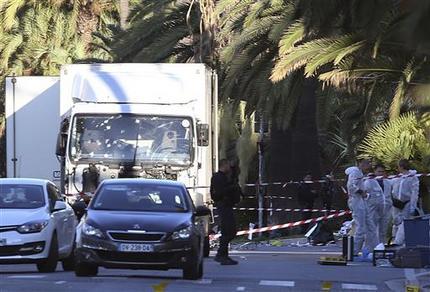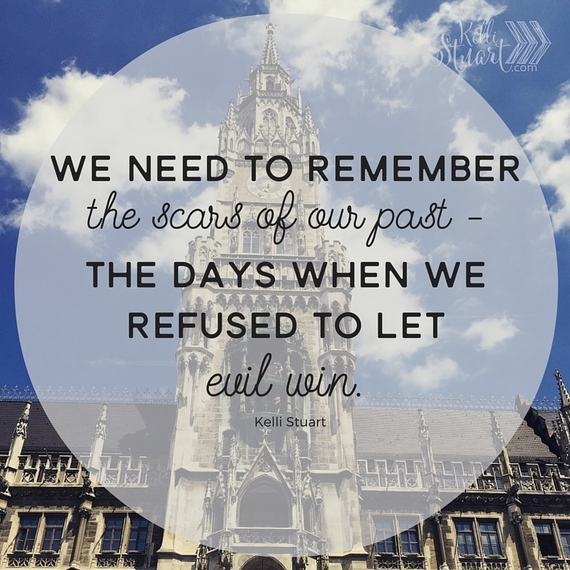Once again, the world is reeling at the news of yet another terror attack. A truck plowed it's way through a crowded street, mowing people down, and when it was all said and done 84 people have been reported dead with dozens more injured.
 AP Photo/Luca Bruno
AP Photo/Luca Bruno
And the world asks - When will it end?
I don't like seeing the images pouring in from Nice. It hurts. Photos like that of a child lying in the street, covered by a sheet next to a baby doll are heart-shattering. I want to look away, to pretend it didn't happen.
I don't want to see these pictures. I don't want to swallow over another lump in my throat and blink back the tears stinging my eyes. I don't want to feel this pain.
But I can't turn away, and neither can you.
I've learned from experience that the best way to honor the fallen is to look at the way in which they died. This isn't comfortable, and sometimes the images are beyond what we can stomach, but by braving the discomfort, we offer some dignity to these deaths.
Facing these atrocities head on also insights anger, and we will not be able to defeat ISIS if we don't get angry. As Americans, our first impulse is to turn away. We want to sanitize the events because we've grown accustomed to a level of comfort that makes these painful photos too uncomfortable.
But if 9/11 taught us anything, it's that we shouldn't turn away - not completely. We can't block the heartache out, because if we're going to honor the fallen, then we need to first look at them.
I learned this lesson years ago from a man named Oleg.
I was in Kiev, Ukraine doing research for a project I was working on, and I had just finished speaking to a classroom full of students. As I packed up to leave, my interpreter noticed Oleg standing in the shadows of the hallway. He wanted to talk to me.
A veteran of the Red Army, Oleg gave me a glimpse into the heartache he experienced in World War II. He described the battles and the constant, nagging fear that he felt in those days of war. He told me of the bitter cold, and about how he and his comrades sat around the fire at night and talked about anything but the war.
Finally, he told me that he was one of only six from his battalion to survive.
"I saw my friends die every day," he said. "I watched them fall to the ground. Sometimes it was fast, and sometimes it happened slowly. And it was always terrible."
Oleg paused frequently. It almost felt like he was reliving the moments right there in front of us, and maybe he was. When our conversation was over, he had made it clear he wanted me to tell the real stories of those dark years. He didn't want me to gloss over the facts, or to offer a shiny American version of the war.
He wanted me to look at what happened to him, to his friends and his country, and to not turn away from the horror of it all. He wanted me to learn so that maybe we could prevent those events from happening again.
At a time when the world seems to be spinning out of control, we need to look at the scars of our past. We need to remember the days when the world joined together, looked evil in the eye and refused to let it reign.
We cannot turn away from the sadness, hiding our eyes from the grief. Those 84 people deserve better than that. All of the innocents whose blood has been shed by the hands of evil and injustice need us to stand up and face this fight head on.
We need to stand with France. We need to stand with Belgium, and Turkey, and Orlando, and...we need to stand together. We need to stand with humanity.
We need to remember, and we need to fight back.
We owe that to the men and women around the world who fought and died in years past. We owe it to the men, women, and children who died yesterday, and we owe it to all those who have been murdered in our most recent history. It's time we really looked at the images flooding our news feed, and we got angry enough to do something about it.
Kelli Stuart is the author of Like a River From Its Course, an epic story of war, love, grief, and redemption set in World War II Soviet Ukraine. (Kregel Publications, June 2016)
Our 2024 Coverage Needs You
It's Another Trump-Biden Showdown — And We Need Your Help
The Future Of Democracy Is At Stake
Our 2024 Coverage Needs You
Your Loyalty Means The World To Us
As Americans head to the polls in 2024, the very future of our country is at stake. At HuffPost, we believe that a free press is critical to creating well-informed voters. That's why our journalism is free for everyone, even though other newsrooms retreat behind expensive paywalls.
Our journalists will continue to cover the twists and turns during this historic presidential election. With your help, we'll bring you hard-hitting investigations, well-researched analysis and timely takes you can't find elsewhere. Reporting in this current political climate is a responsibility we do not take lightly, and we thank you for your support.
Contribute as little as $2 to keep our news free for all.
Can't afford to donate? Support HuffPost by creating a free account and log in while you read.
The 2024 election is heating up, and women's rights, health care, voting rights, and the very future of democracy are all at stake. Donald Trump will face Joe Biden in the most consequential vote of our time. And HuffPost will be there, covering every twist and turn. America's future hangs in the balance. Would you consider contributing to support our journalism and keep it free for all during this critical season?
HuffPost believes news should be accessible to everyone, regardless of their ability to pay for it. We rely on readers like you to help fund our work. Any contribution you can make — even as little as $2 — goes directly toward supporting the impactful journalism that we will continue to produce this year. Thank you for being part of our story.
Can't afford to donate? Support HuffPost by creating a free account and log in while you read.
It's official: Donald Trump will face Joe Biden this fall in the presidential election. As we face the most consequential presidential election of our time, HuffPost is committed to bringing you up-to-date, accurate news about the 2024 race. While other outlets have retreated behind paywalls, you can trust our news will stay free.
But we can't do it without your help. Reader funding is one of the key ways we support our newsroom. Would you consider making a donation to help fund our news during this critical time? Your contributions are vital to supporting a free press.
Contribute as little as $2 to keep our journalism free and accessible to all.
Can't afford to donate? Support HuffPost by creating a free account and log in while you read.
As Americans head to the polls in 2024, the very future of our country is at stake. At HuffPost, we believe that a free press is critical to creating well-informed voters. That's why our journalism is free for everyone, even though other newsrooms retreat behind expensive paywalls.
Our journalists will continue to cover the twists and turns during this historic presidential election. With your help, we'll bring you hard-hitting investigations, well-researched analysis and timely takes you can't find elsewhere. Reporting in this current political climate is a responsibility we do not take lightly, and we thank you for your support.
Contribute as little as $2 to keep our news free for all.
Can't afford to donate? Support HuffPost by creating a free account and log in while you read.
Dear HuffPost Reader
Thank you for your past contribution to HuffPost. We are sincerely grateful for readers like you who help us ensure that we can keep our journalism free for everyone.
The stakes are high this year, and our 2024 coverage could use continued support. Would you consider becoming a regular HuffPost contributor?
Dear HuffPost Reader
Thank you for your past contribution to HuffPost. We are sincerely grateful for readers like you who help us ensure that we can keep our journalism free for everyone.
The stakes are high this year, and our 2024 coverage could use continued support. If circumstances have changed since you last contributed, we hope you'll consider contributing to HuffPost once more.
Already contributed? Log in to hide these messages.


